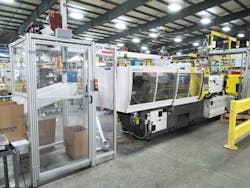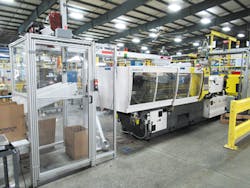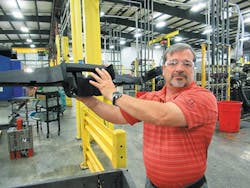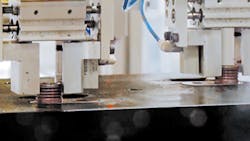Restructuring gives Thomson Plastics new lease on work
Custom injection molder Thomson Plastics Inc. has reinvented itself.
Five years ago, its operation reflected the production cycle of its largest customer — it molded parts for six to eight months, then laid off most of the workers for four months until production started again.
Today, a comprehensive restructuring plan is paying off with year-round employment for processing staff, the opening of two new plants, supplier awards from customers and the acquisition of its first brand-new molding machines.
"We are turning the corner, but this is a new Thomson Plastics," President and COO Rick Kibbey said during an interview at the company's headquarters in Thomson, Ga. "We are not where we want to be yet, but we are certainly better than we used to be."
Thomson Plastics was founded in 1973 in Mississippi as CAE Plastics to supply golf cart manufacturer Club Car LLC, which was located near Augusta, Ga. In 1995, at the request of Club Car, CAE moved to Thomson, about 30 miles west of Augusta, and changed its name to Thomson Plastics.
Thomson Plastics has been owned by Altus Capital Partners since 2005.
Club Car tended to build its golf carts from January to June, so Thomson Plastics followed that timeline. Other lawn and garden customers followed a similar schedule.
The restructuring plan started with changing the seasonal nature of the business. "I made a commitment that we would figure out how to employ everyone year-round. The key to that was finding additional year-round business," Kibbey said.
Molding automotive parts was one of the answers. Thomson Plastics, which previously had no automotive business, now has 12 percent to 15 percent of its total business in the Tier 2 automotive sector. Kibbey said he would like to see that increase to about 25 percent since it is not seasonal business.
Other customers have been added strategically.
"We select our customers very carefully," said Tom Talboys, director of sales and program management. "We usually work with customers that have significant programs to launch. We form a relationship before going to the next."
Until this year, Thomson Plastics purchased used molding machines for all three of its plants. But because of the restructuring program, the company has purchased seven new presses with 220 tons of clamping force from Borche. One was delivered to the plant in Thomson earlier this year and two more were delivered in June. Two were delivered to each of the company's plants in Lexington, N.C., and Howell, Mich., in June.
Between September 2017 and September 2018, Thomson Plastics plans to launch 150 new molds for golf cart, recreational and automotive products.
Three of the new Borche machines are earmarked for new projects.
How did Thomson Plastics pick Borche machines? "There are a lot of good press-makers and we were looking at presses from some of the well-known names," Kibbey said. "Price is always an issue but so is reliability and performance.
"We had a relationship with Nationwide UPM Machinery Sales in Troy, Mich., which also represents Borche. They offered us a competitive price for well-equipped machines."
Kibbey said he visited three molders who use Borche presses. "I talked to their maintenance people about performance of the Borche presses," he said. "I came to the point that we could feel comfortable putting these presses on our floor."
Are there more new Borche injection presses in Thomson Plastics' future?
"Yes, but we are looking at others, as well," Kibbey said. "We were very impressed that Engel has recognized the need to produce an economical machine, the Wintec model.
"Anyone can walk into a plant and see a long line of green Engels and say 'Wow!' But you are going to pay for them," Kibbey said. "But does every part need the capability of that high-priced green machine? I would say no. Wintec looks pretty promising."
Thomson performs sophisticated molding with machines it purchased and rebuilt. The average machine age is about 15 years.
Nearly all 38 presses in the Thomson plant, which have clamping forces ranging from 165 tons to 3,150 tons, are equipped with Wittmann robots.
The headquarters' three new machines will sit side by side and be run by one operator. They also will have Wittmann robots.
Thomson Plastics in January volunteered to be a beta test site for RJG Inc.'s new CoPilot product, which is currently operating on six presses.
CoPilot functions as a notification system, a communications tool and a coach. It standardizes troubleshooting procedures, automatically performs process audits and logs process changes, and notifies the operator if a variable moves outside the set tolerances. It is designed to be used by operators of any skill level.
"When we were told about CoPilot, it seemed like the next logical step," Kibbey said. "We are still gathering data to show how much of a savings we are getting in improved uptime and reduced scrap, but we believe we are seeing it."
Kibbey said when there is a problem, "the processor does not have to go over and just twist dials. CoPilot tells him what to do. It is the road map."
He said he expects CoPilot eventually will be placed on every press companywide. "The price of the investment versus what I believe we are losing by not having CoPilot makes it a pretty simple decision."
Kibbey said Thomson Plastics has been using RJG for training for the past six years. "Technical expertise makes you or breaks you," he said. "It is the difference between being good at what you do or mediocre."
All the processing technicians and tool setters have been through a knowledge assessment by RJG, which conducts training in the plant once a year. Employees are also sent to RJG training facilities in Georgia and North Carolina and the company currently has four master molders certified by RJG.
In addition to the CoPilot product, Thomson Plastics uses an IQMS reporting system for tracking production and providing reports. It supports the company's lean manufacturing efforts.
Kibbey said the company does not have an allegiance to particular brands of auxiliary equipment.
"A lot of that stuff is so user-friendly and equal in performance, so we don't think the brand matters very much," Kibbey said. "In this plant, the staff is comfortable with Wittmann robots, but the other two plants use Sepro, Star and some Wittmanns."
One collaborative robot from Universal Robotics is used on overmolding a steering wheel. A 700-ton press makes the first shot, then the robot extracts the part, drops it on a conveyor to go through a water bath and air drying. Then it inserts the part into a second press for overmolding.
The collaborative robot enabled Thomson Plastics to reduce the number of operators for the manufacturing cell from three to one per shift. The Thomson plant operates three shifts per day, five days a week.
Kibbey said he expects to use more collaborative robots in the future.
Another interesting insert molding project involves a cover for a deep-cycle battery. A robot picks up battery terminal inserts and places them into the mold, then takes the part out of the press. The process was originally done manually, but automation improved cycle time by 25 percent and provided more consistency.
Another good example of Thomson Plastics' use of automation involves 6-volt battery cases that are molded, then dropped onto a conveyor that takes them through a test for gate seal-off, then sorts them.
"The technology is not always in the press," Kibbey said.
Additionally, the company has plenty of experience with gas-assisted molding. "We have 25 to 30 [different types of] gas-assist parts being molded here every day," Kibbey said. The company uses the Cinpres gas-assist process.
"We have taken over a lot of gas-assist projects that were in trouble elsewhere," he said.
Kibbey credits Thomson Plastics' success to his staff's ability use the company's equipment to its full potential. Thomson buys presses and auxiliary equipment and acts as its own integrator to put together work cells.
"When we become the integrator to put pieces of equipment together into a system, there are always going to be problems," he said. "We buy the pieces and put our work cells together. I see it as an advantage. Our workforce learns while they are doing it and when they finish, they own it."
Kibbey said his team "understands the capabilities of each press and does not try to mold parts the machine is not capable of running."
Club Car recently named Thomson Plastics its supplier of the year for 2017. "I think this is evidence that we have turned the corner," Kibbey said.
Ron Shinn, editor
Contact:
Contact: Thomson Plastics Inc. Thomson, Ga., 706-595-0658,
About the Author
Ron Shinn
Editor
Editor Ron Shinn is a co-founder of Plastics Machinery & Manufacturing and has been covering the plastics industry for more than 35 years. He leads the editorial team, directs coverage and sets the editorial calendar. He also writes features, including the Talking Points column and On the Factory Floor, and covers recycling and sustainability for PMM and Plastics Recycling.




